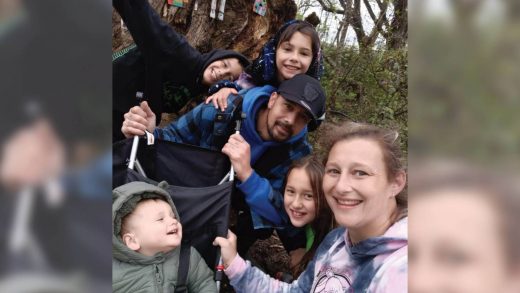
CHARLESTON, S.C. (AP) — The Democrats’ first primary of the 2024 presidential contest contains little mystery. South Carolina propelled President Joe Biden to the Democratic nomination four years ago and he faces only token opposition when voting concludes Saturday.
What’s at stake for Biden is the depth of support he receives from Black voters. They made up half the party’s primary electorate in the state in 2020 and gave him a resounding victory, a win he rewarded by moving South Carolina to the front of the party’s nominating process. In the general election, Biden was backed by 91% of Black voters nationwide, according to AP VoteCast.
Whether he enjoys a similar level of support this year has implications far beyond South Carolina.

Biden’s support among Black voters has waned considerably since he assembled his winning coalition four years ago. His approval rating among Black adults is 42% in the latest Associated Press-NORC Center for Public Affairs Research poll, a substantial drop from the first year of his presidency.
That’s a potentially troubling sign as he prepares for a rematch against former President Donald Trump, the overwhelming favorite to win the Republican nomination. Lackluster turnout among Black voters in South Carolina’s primary could signal a broader dip in enthusiasm. Biden will need to energize Black voters in the key swing states of Georgia, Michigan, Wisconsin and Pennsylvania.
His campaign is not taking the state for granted. Biden and Vice President Kamala Harris have been visiting in the lead-up to the primary and have promised to keep advocating for the interests of the Black community.
Interviews with a wide array of Democratic-leaning Black voters in South Carolina ahead of Saturday’s primary revealed general support for the president, from early voting centers in Columbia, the state capital, to a historically Black college in Orangeburg to a voter-mobilization event in Charleston. But they also provided warning signs: Voters want Biden to spell out his priorities for a second term while expressing concerns about his age and how he is handling inflation and the economy.
GENERATIONAL DIVIDE
Younger Black voters said they want Biden to represent their concerns and to see them prioritized if he wins a second term.
Alexandrea B. Moore, a 22-year-old senior at South Carolina State University, said Biden could have been more transparent about the challenges he faced in fulfilling his promise of widespread student loan forgiveness, a plan that ultimately was struck down by the Supreme Court.
“If Biden wants to be able to regain the trust of the U.S. citizens, then there does need to be a little bit of transparency on why things didn’t go the way that they were promised to us,” she said.
Olivia Ratliff, a 19-year-old sophomore at the college, the state’s only public historically Black college or university, wants to hear Biden focus on education issues, primarily school safety and the teacher shortage.
South Carolina school districts reported over 1,600 teacher vacancies at the beginning of the 2023-24 school year, a 9% increase from the year before, according to a report from the South Carolina Education Association.
“It’s bad enough we send our children to schools with no teachers, but then they also risk their lives every day going to school,” said Ratliff, an education major.
Kailyn Wrighten feels let down by Biden because she thinks his administration has been too quiet on social justice issues stemming from the protests against police violence in 2020. But seeing her mother’s student loan forgiven before Biden’s initial plan was struck down was a relief and something she considers a bright spot for the administration, so she plans to vote for Biden in the primary.
A 22-year-old senior at South Carolina State, Wrighten also expressed a frustration shared by most younger voters interviewed — that Biden decided to run for reelection rather than make way for a new generation of Democrats.
“This is something we’ve worked up to for 18 years and kind of finally being able to exercise this, and you’re like, ‘This is what I’m left with right now?’” she said.
STUDENT LOANS, ECONOMY
Biden’s faltering attempts to push a broad plan for student loan forgiveness and his handling of the economy came up repeatedly as top-of-mind issues in interviews with more than a dozen voters.
Sheridan Johnson cast an early vote for Biden in Columbia. She applauded the fact that his administration reduced some loans, but is hoping for more.
“I’m waiting for that to pass because I really need some student loans forgiven,” said Johnson, 53.
Biden’s initial plan was struck down by the Supreme Court. The administration then developed a repayment plan set to take effect this month. Under it, borrowers won’t see interest pile up as long as they make regular payments.
Inflation remains a major concern. While price hikes have cooled in recent months and the economy is growing, that has not had a significant trickle-down effect on Americans’ outlook or benefited Biden.
Laverne Brown, a 69-year-old retiree in Columbia, said Biden needs clear messaging to show voters what he has done to improve the economy and what more he would do if given a second term.
“As an American citizen, the message that would make me feel really good is knowing that there’s continued concern for the working people, the people that have really put in … years of working and now are living on a lower income,” she said.
She noted that some in the city don’t have access to grocery stores within a reasonable distance, which adds to their financial strains.
TOO OLD?
Age concerns came up frequently in the interviews, and not just among younger voters.
Polling has consistently shown a broad lack of excitement about the prospects for a Biden-Trump rematch. The age of the candidates — Biden is 81, and Trump 77 — is among the top concerns.
An August AP-NORC poll found that 77% of U.S. adults, including 63% of Black adults, said they believe Biden is too old to effectively serve another term as president.
“They’re as old as I am, and to have these two guys be the only choices, that’s kind of difficult,” said Charles Trower, a 77-year-old from Blythewood, South Carolina. “But I would much rather have President Biden than even consider the other guy.”
Trower, a veteran, said Biden has implemented changes that improved the quality of life for veterans.
Joshua Singleton, a 19-year-old sophomore at South Carolina State, shared the sentiment: “We should have, you know, younger presidents to represent us.”
VOTING RIGHTS, ABORTION, OVERDOSES
Some of the nation’s most divisive and personal issues — voting rights, abortion and the overdose epidemic — also were among the top talking points for many of the Black voters interviewed.
Several noted the failure of Democrats to pass voting rights legislation during the first two years of Biden’s presidency as a response to restrictive laws passed by several Republican-controlled states. Democrats’ slim majority in the Senate was not enough to overcome Republican procedural moves to prevent the legislation from moving forward.
“The ability to protect voting rights needs to be expanded,” said Seth Whipper, 74, a former Democratic state representative who was contacted last week by voting rights activists during a community canvassing event in Charleston. “Every state in the nation, every territory should be subject to the Voting Rights Act. It’s just that important.”
Biden and Harris have been focusing on the stakes for abortion rights in this year’s election, a message that appeared to resonate with voters. Several wanted to know what a second Biden administration plans to do to protect reproductive rights.
“I’m a strong believer in women’s rights. I have a wife. I have a daughter,” said Tony Thomas, who is 71 and cast his ballot at an early voting site in Columbia. “I believe they should have a right not to have the government interfere in their lives.”
Fentanyl, which along with other synthetic opioids is the leading culprit in an overdose crisis killing Americans at a record rate, concerns Saundra Trower, a 75-year-old from Blythewood, just outside the state capital.
She wants Biden to continue trying to fix it and figure out how fentanyl is flooding the country and why so many people are addicted.
“That’s the biggest thing for me,” she said. “There are too many young people and even middle-aged people who are dying from fentanyl.”
STICKING WITH BIDEN
The voters interviewed were among the most engaged Democrats in the state, taking advantage of early voting opportunities or helping to register and persuade others to get to the polls. Many said they generally supported Biden and would vote for him in the primary and November’s general election, driven by a sense that he was trying to address their concerns.
They pointed to strides he has made in diversifying the federal judiciary and government agencies, funneling more funding to historically Black colleges and universities, and taking steps to reduce unemployment.
Many also said they recognize that Biden can’t make everything happen on his own, given the divided power and deep polarization in Congress.
Austin Nichols, a 28-year-old lawyer in Columbia, said Biden is pushing the country in the right direction, particularly in addressing such things as racial discrimination in housing.
“One thing that I appreciate that directly impacts me are reforms and new rules into governing race discrimination when it comes to home property values and getting appraisals, and the inherent biases that are in there,” Nichols said.
In his view, Biden is a president “for the people, and not for self-interest.”
LaJoia Broughton, a 42-year-old small-business owner in Columbia, voted for Biden in 2020 and said she will do so again this year, citing reasons both local and national: his administration providing more opportunities for Black-owned businesses, and what she sees as a threat to the nation’s foundational governing principles under a second Trump presidency.
“We can’t live with a leader that will make this into a dictatorship. We can’t live in a place that is not a democracy. That will be a fall for America,” Broughton said. “So my vote is with Biden. It has been with Biden and will continue to be with Biden.”
But several of those interviewed also acknowledged that it could be difficult to motivate voters who don’t always show up the polls, especially those who have seen little change in their circumstances.
The Rev. Dr. Byron L. Benton, pastor of Mount Moriah Missionary Baptist Church in North Charleston, said that is particularly true for those who haven’t seen much improvement in their lives, no matter who was president.
Biden has had extensive outreach to the state in an effort to maintain his bond with its Black electorate. He recently spoke at Mother Emanuel AME Church in Charleston, where in 2015 nine Black parishioners were gunned down by a white assailant they had invited to join their Bible study.
To Benton, it seems that Biden is connecting more directly with Black churches this time than even during his campaign four years ago.
“At the end of the day, whether you are excited or have no excitement, what I’m still hearing is based on what’s present,” he said. “The candidate that the majority of African Americans are going to vote for is still President Joseph Biden.”
___
Emily Swanson, the Associated Press’ director of public opinion research, contributed to this report.
___
The Associated Press’s coverage of race and voting receives support from the Jonathan Logan Family Foundation. See more about AP’s democracy initiative here. The AP is solely responsible for all content.


